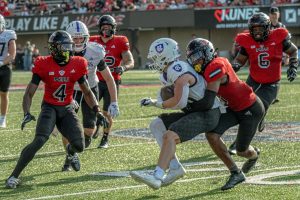Panel outlines the Patriot Act
July 15, 2003
Debates about the U.S.A. Patriot Act have ignited across the country because of the perception of its possible violation of civil liberties.
In response to this, the Student Affairs staff development committee hosted a panel discussion Thursday to better inform university employees about the act.
The act’s name stands for “Uniting and Strengthening America by Providing the Appropriate Tools Required to Intercept and Obstruct Terrorism.” President George W. Bush signed the act into effect Oct. 26, 2001 – just more than a month after the Sept. 11 attacks.
The act increased foreign student monitoring, partly because of the fact that two of the Sept. 11 hijackers were in this country on student visas, said Kathy Buettner, executive director of state and federal relations.
“Higher education after 9/11 changed their position nationally,” she said.
At the moment, there are alert lists to help agencies know to deny student visas to people from states that support terrorism. Those states include Cuba, Libya, North Korea, Sudan, Iran and Iraq, Buettner said.
Michael Zemites, special agent and supervisor at the FBI Rockford Resident Agency, spoke on the agency’s usage of the Patriot Act. He said the agency responds to and investigates any and all violations that fall under FBI jurisdiction.
However, he said the act is “designed to prevent law enforcement from trampling on civil liberties and the rights of Americans.”
Zemites added that agents are aware that they can be held responsible for actions they take that overstep their boundaries.
The act allows for law enforcement to intercept voicemail and e-mail by warrant, but it has to know that an individual is involved in terrorist activities before acting, he said.
State Representative David Wirsing said one of the main things to understand is that the Patriot Act is not a singularly new idea – line items in the act refer to existing acts and laws.
He thinks the act may help deny many possible terrorists access to the country. As it stood, he said, the student visa was used as a way to get into the United States.
Sue Willis, president of the Faculty Senate and executive secretary of the University Council, posed the question of whether foreigners in the United States have the same rights as U.S. citizens.
Zemites said when people enter this country, they do have the same rights. For example, he said, when he arrests someone, no matter where they are from, he reads them their Miranda rights.
Another audience member asked what would launch or justify an investigation.
Zemites said usually information is passed to the FBI by someone who might have specific information about someone. Then the bureau determines the credibility of the person giving the information, examines their motives and then examines the nature of the allegation to determine if it is of interest to the FBI, local law enforcement agencies or if it has any value at all.
“Typically it takes someone to come to us and explain what they have, and we have to decide if this is something the FBI wants to dedicate its resources to,” he said.
David Dunlap, coordinator of marketing and public relations for Student Housing and Dining Services, explained a reason why this discussion meeting was held. He said that while FBI investigations at universities may be low, university employees need to know how to comply with the federal measures and also how to protect the privacy of students and staff.






